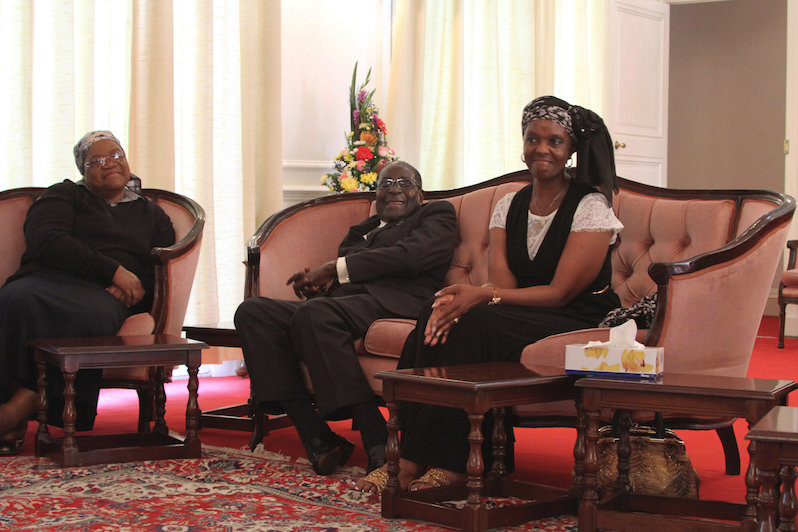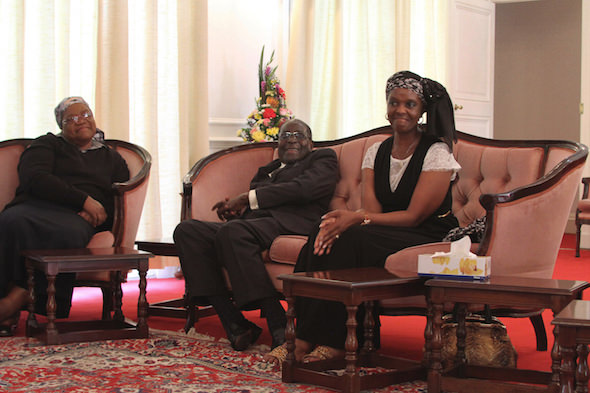Ascendance and Disruption in Zimbabwe, a Tale of Two Political Women
How the African nation's first lady, Grace Mugabe, successfully led a campaign to oust Vice President Joice Mujuru, the woman whom many believed would be its next president.

Zimbabwean President Robert Mugabe with his wife, Grace, right, and former Vice President Joice Mujuru, left, in Harare in 2014. (AP / Tsvangirayi Mukwazhi)
HARARE, Zimbabwe — Until last year, Joice Mujuru was widely expected to succeed Zimbabwe’s 91-year-old president, Robert Mugabe. But in December, Mujuru, 60, was fired from her positions as vice president of the country and of the Zimbabwe African National Union Patriotic Front (ZANU PF), the ruling party she had served for more than three decades. Then, early in April, she was ignominiously expelled from the party entirely.
In the lead-up to Mujuru’s expulsion, Grace Mugabe, 49, the president’s wife, spearheaded a monthslong attack campaign on her character and political credentials. At a series of rallies and demonstrations, Grace Mugabe accused Mujuru of planning to assassinate her and the president as well as of being involved in corruption in large government projects, of demanding kickbacks on government contracts and of fomenting factionalism in the ZANU PF.
Speaking to military veterans in October, Grace Mugabe said of Mujuru: “One, she survives on extortion and does not want to work for herself. Two, she wants to grab power from the president illegally. Three, all minerals you [Mujuru] declare that they are yours, and four, you are incompetent.”
She also claimed Mujuru was secretly working for Western countries like the United States and the United Kingdom.
Robert Mugabe and some of his senior colleagues joined in the smear campaign, accusing Mujuru of plotting to carry out a coup d’etat. He also said she had participated, “topless and with breasts hanging,” in rituals with Nigerian spiritualists to cast evil spells on him.
Mujuru, who rarely responded to the charges against her, said in a public statement in March that the allegations were “fantastical and sexually lewd.” She added: “I am at a loss as to how I continue to be the subject matter of presidential conjecture and fantasy. I don’t do such things.”
Mujuru also dismissed suggestions that she wished to topple or assassinate the president, saying: “It is disturbing that the allegations that I tried to or was part of a conspiracy to assassinate the president have now been reduced to allegations of witchcraft whose versions change on a daily basis. I am sure even the ordinary Zimbabwean has become tired of this story in its various guises. It’s a charade which has lost steam.”
Joice Mujuru and Grace Mugabe could hardly be more different.
Mujuru, the widow of liberation war hero and post-independence army commander Solomon Mujuru, first devoted her life to the liberation struggle against white rule, and after independence in 1980, she devoted it to both her party and country, first in Parliament and then in other influential positions in the government.
Last year, Grace Mugabe, after being enrolled for just four months at the University of Zimbabwe where her husband is chancellor, was controversially awarded a doctorate. Soon thereafter, on the back of her campaign against Mujuru, she was propelled into the leadership of ZANU PF’s Women’s League and of the party political bureau.
Her career had begun much more modestly, as a member of the presidential typing pool. When she first met Robert Mugabe, she was married to a pilot in the Air Force of Zimbabwe and was mother to a young son. The two began an affair as the former first lady, Sally, a Ghanaian, was dying of kidney disease and Grace’s husband was shipped off to the Zimbabwean Embassy in China. The couple’s oldest child, daughter Bona, was born before Sally Mugabe died in 1992, while their son Robert arrived less than a year later. Robert and Grace Mugabe married in 1996, producing their third and last child, son Chitunga, the following year.
In 1980, Robert Mugabe’s party came to power when the country was still known as Rhodesia, after a civil war and then elections brokered by Britain, its former colonial power. Mugabe has led Zimbabwe since then. Many believe he intends to remain in office until he dies.
He faced his first serious challenge to power when an upstart opposition party nearly won a general election in 2000. The new Movement for Democratic Change (MDC), led by the popular former trade unionist Morgan Tsvangirai, contested the presidential poll two years later. Tsvangirai disputed the results in court, but his application was never concluded. Eventually, the MDC won a narrow victory in 2008 in the presidential poll, though hundreds of its supporters were killed during the run-up to the second round, so Tsvangirai withdrew.
The international community, including the African Union and even South Africa, refused to recognize the outcome when Mugabe was the only candidate in the runoff. The economy was also in tatters, with record-breaking inflation that many economists say was caused when agricultural exports crashed after Mugabe gave the go-ahead to drive white farmers from their land.
Against the background of economic catastrophe, South Africa stepped in and mediated the formation of a unity government between Mugabe’s ZANU PF and the MDC. During the unity government, Mujuru often intervened to smooth the way for the MDC ministers and officials who frequently faced political and administrative roadblocks set up by Mugabe’s ZANU PF ministers and officials.
The unity government, which began to repair the economy and saw political violence decrease and also produced a new constitution, ended when Mugabe and his ZANU PF decisively won the 2013 elections.
The results were hotly disputed by opposition parties and some observers.
It was during the run-up to the ZANU PF congress last year that Grace Mugabe launched her vicious campaign against Mujuru. Some saw Mugabe’s attack as a so-called bedroom coup aimed at establishing a ruling dynasty and at ushering her to the presidency following the inevitable demise of her aged and increasingly frail husband. Now, observers note that it was more likely in support of the unpopular political strongman Emmerson Mnangagwa, who has replaced Mujuru in the party and government. They say that Mnangagwa will ensure that President Mugabe remains in power until his death, thus guaranteeing continued power and a lavish lifestyle for the president and for his family even after Robert Mugabe dies.
The Zimbabwean political analyst Vince Musewe has referred to the situation is “dog eat dog”: “There is method in the madness, as this ensures Mugabe’s survival till he dies. Grace is just the dog barking out there, while they pull strings behind her.” While government salaries, including that of the president, are capped, Mr. Mugabe frequently travels with his wife and family members on government business, thus earning millions of dollars annually in unlimited and unaudited daily travel stipends for them all.
The state also pays all the expenses for his personal residences, including President Mugabe’s privately owned high-walled mansion in the suburbs of the capital Harare, built on 35 hectares of prime land, complete with man-made lakes and populated by wildlife. Mujuru appears to be financially secure. She is at present one of the largest commercial farmers in the country, using land taken from whites during the country’s chaotic and often violent land reform program launched after 2000. On May 6, however, her security was threatened on a personal and financial level when her Alamein Farm in Beatrice was damaged by a fire that was subsequently under investigation by local authorities.
Mujuru’s supporters hold her up as a political leader untainted by the corruption and violence of the ruling party. But seasoned observers say that she never publicly opposed these excesses in ZANU PF and in fact benefited from them.
Her political future is now uncertain, and members of her family have told local media that they now fear for her safety.
Independent journalism is under threat and overshadowed by heavily funded mainstream media.
You can help level the playing field. Become a member.
Your tax-deductible contribution keeps us digging beneath the headlines to give you thought-provoking, investigative reporting and analysis that unearths what's really happening- without compromise.
Give today to support our courageous, independent journalists.






You need to be a supporter to comment.
There are currently no responses to this article.
Be the first to respond.